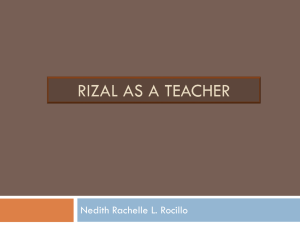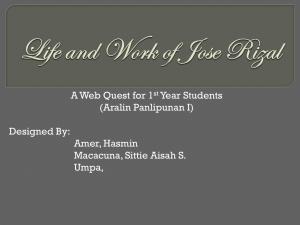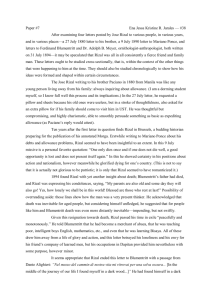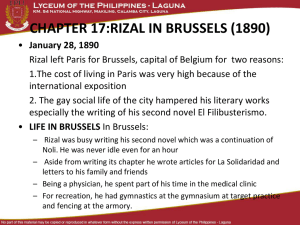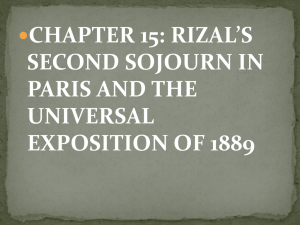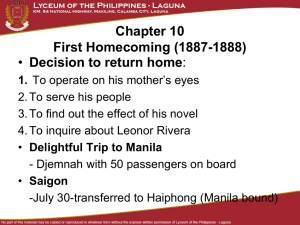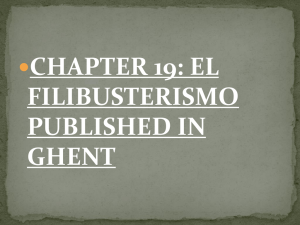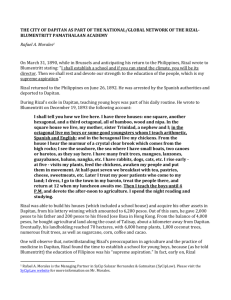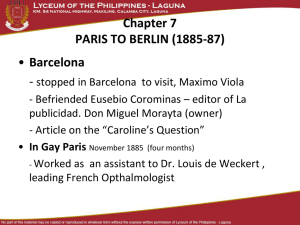EXILE IN DAPITAN - Wikispaces - history5H23-2jbp
advertisement
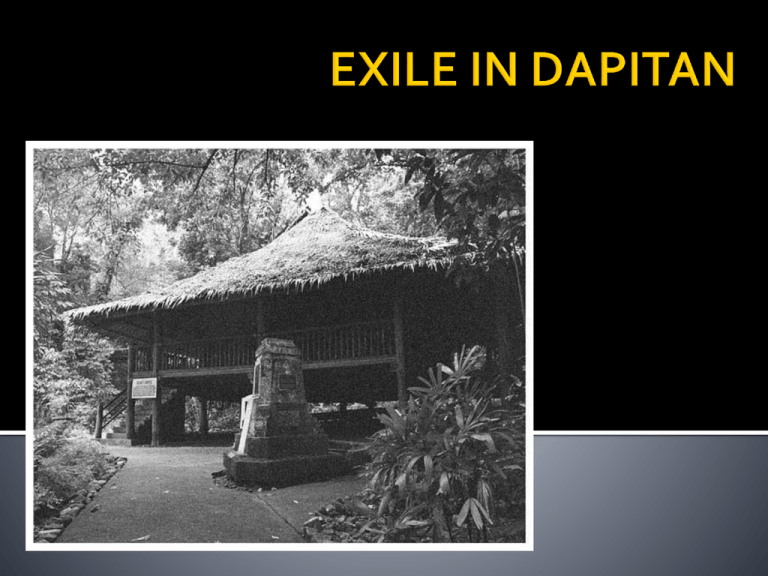
On July 7, 1892 Rizal was summoned to Malacanan. Governor Despujol ask him if he still wanted to go back to Hongkong. Rizal replied in the affirmative. When they arrived from Hongkong the Governor-General produced some handbills which were found in Lucia’s pillows. The incriminatory handbills were printed copies of an anti-friar article entitled, “Pobres Frailes (Poor Friars)” under the authorship of Father Jacinto and bore the imprint of “Imprenta de los Amigos Manila.” This article was a satire against the rich dominicans who amassed fabulous wealth contrary to their vow of poverty. Rizal had published books and articles abroad which showed disloyalty to Spain and which were “frankly anti-Catholic” and “imprudently anti-friar”. A few hours after his arrival in Manila “there was found in one of the packages . . . A bundle of handbills entitled “Pobres Frailes” in which the patient and humble generosity of Filipinos is satirized, and which accusation is published against the customs of the religious orders.” His novel El Filibusterismo was dedicated to the memory of three “traitors” (Burgos, Gomez, Zamora), and on the title page he wrote that in view of the vices and errors of the Spanish administration, “the only salvation for the Philippines was separation from the mother country.” “The end which he pursues in his efforts and writings is to tear from the loyal Filipino breasts the treasures of our holy Catholic faith.” The ship which brought Rizal to Dapitan also carried a letter by Fr. Pablo Pastells, Superior of the Jesuit Society in the Philippines to Fr. Antonio Obach, Jesuit missionary of Dapitan. Father Pastells informed the missionary that Rizal could live in the Jesuit mission house on the following conditions: That Rizal publicly retract his errors concerning religion, and make statements that were clearly pro-Spanish and against revolution. That he perform the church rites and make general confession of his past life. That henceforth he conduct himself in an exemplary manner as a Spanish subject and a man of religion. • Rizal did not agree with these conditions. Consequently, he lived in the house of the commandant, Captain Carnicero. It started when Fr. Pastells sent a book by Sarda to Rizal, with an advice that the latter (Rizal) should desist from his foolishness in trying to view religion from the prism of individual judgment and self-esteem. This interesting debate between two brilliant polemists ended inconclusively. Rizal could not be convinced by Pastells’ arguments; thus he lived in Dapitan beyond the pale of his Mother Church. Rizal led and exemplary life, fruitful of achievements and idyllic in serenity. The members of his family took turns in visiting him in order to assuage his loneliness in Dapitan. He built his own house by the seashore, surrounded by a garden of fruit trees. He had also another house for his school boys and a hospital for his patients. All his available time he devoted to the practice of medicine; his artistic, literary, educational, linguistic and scientific pursuits; to his agricultural and business activities; to certain civic projects; and to his extensive correspondence with Blumentrit, Joest, Rost, Meyer, Knuttel, Kheil, and other scientists of Europe. Rizal conducted his school at his home in Talisay, near Dapitan, where he had his farm and hospital. His favorite rendezvous with his boys was under a Talisay tree, after which the place was named. In honor of this tree, he wrote a poem entitled Himmo A Talisay for his pupils to sing. The death of Leonor Rivera on August 28, 1893 left a poignant void in his heart. He needed somebody to cheer him up in his lonely exile. In God’s own time, this somebody came to Dapitan, like a sunbeam to dispel his melancholy mood. She was a pretty Irish girl of sweet eighteen, “slender, a chestnut blonde, with blue eyes, dressed with elegant simplicity, with an atmosphere of light gayety.” She was born in Hongkong, of Irish parents, on October 3, 1876. Her mother died in childbirth and she was adopted by an american engineer Mr. Taufer, who later became blind. Josephine arrived in Dapitan in February 1895 with blind Mr. Taufer. Rizal and Josephine fell in love with each other at first sight. After a whirlwind romance of one month, they agreed to marry. But father Obach, the parish priest of Dapitan, refused to marry them without the permission of the bishop of Cebu. Mr. Taufer flared up in violent rage and returned to Hongkong alone. Josephine stayed in Manila with Rizal’s family. Later she returned to Dapitan, since no priest would marry them, Rizal and Josephine held hands together and marry themselves before the eyes of God. They lived as man and wife. In the early part of 1896, Rizal was extremely happy because Josephine was expecting a baby. Unfortunately, he played a prank on her, frightening her so that she prematurely gave birth to an 8 month baby boy, who lived only for 3 hours. This lost son of Rizal was named Francisco, in honor of Don Francisco.
